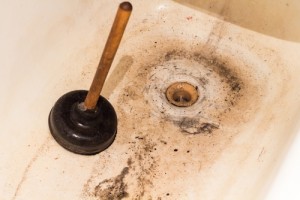In our lifelong mission to maintain a clean and healthy home, we strive to keep our surfaces free from dust, sweep up dirty floors, and regularly wash linens — yet, many people forget about the less superficial tasks, lurking beneath the surface.
Some of the most significant problems are hidden, deep in areas that aren’t visible to the eye. In the case of a clogged and dirty drain, you may not even be aware of the damage until it’s too late.
A blocked drain can have an impact on both your health and the structural security of your home. It’s all too easy for debris, small objects, food, and grease to gradually accumulate within your pipes, obstructing the flow and promoting stagnant, dirty water.
The Dangers of a Dirty Drain
When water drains from your amenities — whether from the kitchen sink, shower, bathtub, or toilet — it’s usually already dirty. If your plumbing pipes can’t extract that water from the property (because of a blockage), the water will get even dirtier, and the initial blockage will worsen.
While a dirty drain causes some minor issues, like backflow and bad odors, there are more serious issues that arise as a result of thriving bacteria in your pipes — such as disease, sickness, and aggravated health conditions. Even water that was initially uncontaminated may encourage the growth of bacteria (such as Legionella), when left to sit stagnant for a prolonged period of time. The primary concerns of dirty drains include:
-
Development or Irritation of Health Issues
Blocked drains often exacerbate existing problems in a person’s health. The presence of additional microbes and bacteria, or the potential to grow mold, irritates those with asthma — leading to more frequent attacks. Chronic health issues can develop through diseases transmitted by fecal matter and exposure to dangerous particles; the type of waste material that builds up in your pipes when you have a blocked drain.
-
Unpleasant Odors
Blocked drains lead to stagnant water collecting within your pipes — usually resulting in a musty odor. This smell can quickly steep a home with an unhealthy (and unpleasant) atmosphere, which may lead to symptoms of nausea and headaches. When a bad smell consistently permeates indoor air — even if it’s not directly harmful to our bodies — it makes people more tired, anxious, and irritable.
-
Structural Damage
While the scent of a blocked drain fills your home, the water itself can soak into the foundation and corners of the home, weakening its structural integrity and causing pipes to leak, or breakdown. Some homes may suffer flooding that warps floorboards, and rots the wall supports.
-
Mold and Pests
Stagnant water attracts pests — like mosquitoes and other insects — that are prone to carrying diseases and germs. The damp atmosphere caused by sitting water creates a perfect breeding ground for mildew and mold.
How to Diagnose a Dirty Drain
The drains in your home are critical to your daily comfort — even if you don’t realize it. They clear out your household waste, and ensure that you and your family aren’t exposed to dangerous bacteria. Unfortunately, because pipes are hidden in most homes, it can be difficult to diagnose a dirty drain. Look out for the following symptoms in your own home, as they are common signs of a blocked drain:
-
Lingering Smells
Dirt, waste, and food residue all produce unseemly odors when left to stagnate over time. If the smell of clogged sewage, or pipes in your home, becomes more noticeable, this could indicate a serious problem with your plumbing. In fact, a particularly harsh scent could indicate the presence of a large blockage, or a damaged pipe.
-
Limited or No Drainage
It’s usually safe to assume that if your drain is suddenly draining more slowly, or fails to drain altogether, there’s a clogging problem in your pipes. Drains can quickly become clogged with soap, hair, grease, and other substances. If you don’t remove the clog quickly, it will worsen with time — leading to serious and expensive damage in your plumbing.
The most common places people notice slower draining are in their kitchen sink, bathroom sink, or bathtub. Contact a professional if you cannot remove the blockage yourself.
-
Puddles of Water
Even a tiny puddle on the floor beside your bath, or sink, could be a serious problem for your home. If you begin to notice pooling water anywhere within your property, contact a professional immediately, as this could be an indication that pipes are starting to leak, break, or even burst.
Protecting Your Home
Although it’s tough to prevent all clogs and blockages from occurring, you can mitigate disaster by identifying a blocked drain as soon as possible. Remember to take action the moment you notice that you could be suffering from a dirty drain; the biggest reason clogged drains become serious problems is that they’re out of sight, and therefore hard to detect. Keep a careful eye on the sources of water in your home, and be vigilant to any unusual smells, pooled water, or drainage behavior. The quicker you clear a problem, the less damage you will face.


 FREE Live Music and Family Fun at Allied Gardens First Fridays The next Allied Gardens First Fridays Summer Concert in the Park is just around the corner. Grab your lawn chairs, bring a picnic, and get ready to meet your
FREE Live Music and Family Fun at Allied Gardens First Fridays The next Allied Gardens First Fridays Summer Concert in the Park is just around the corner. Grab your lawn chairs, bring a picnic, and get ready to meet your  Ideal Plumbing Heating Air Electrical Named Winner of 2023 Better Business Bureau Torch Awards for Ethics in San Diego (San Diego, CA – September 15, 2023) Better Business Bureau Serving the Pacific Southwest (BBB) has named Ideal Plumbing Heating
Ideal Plumbing Heating Air Electrical Named Winner of 2023 Better Business Bureau Torch Awards for Ethics in San Diego (San Diego, CA – September 15, 2023) Better Business Bureau Serving the Pacific Southwest (BBB) has named Ideal Plumbing Heating